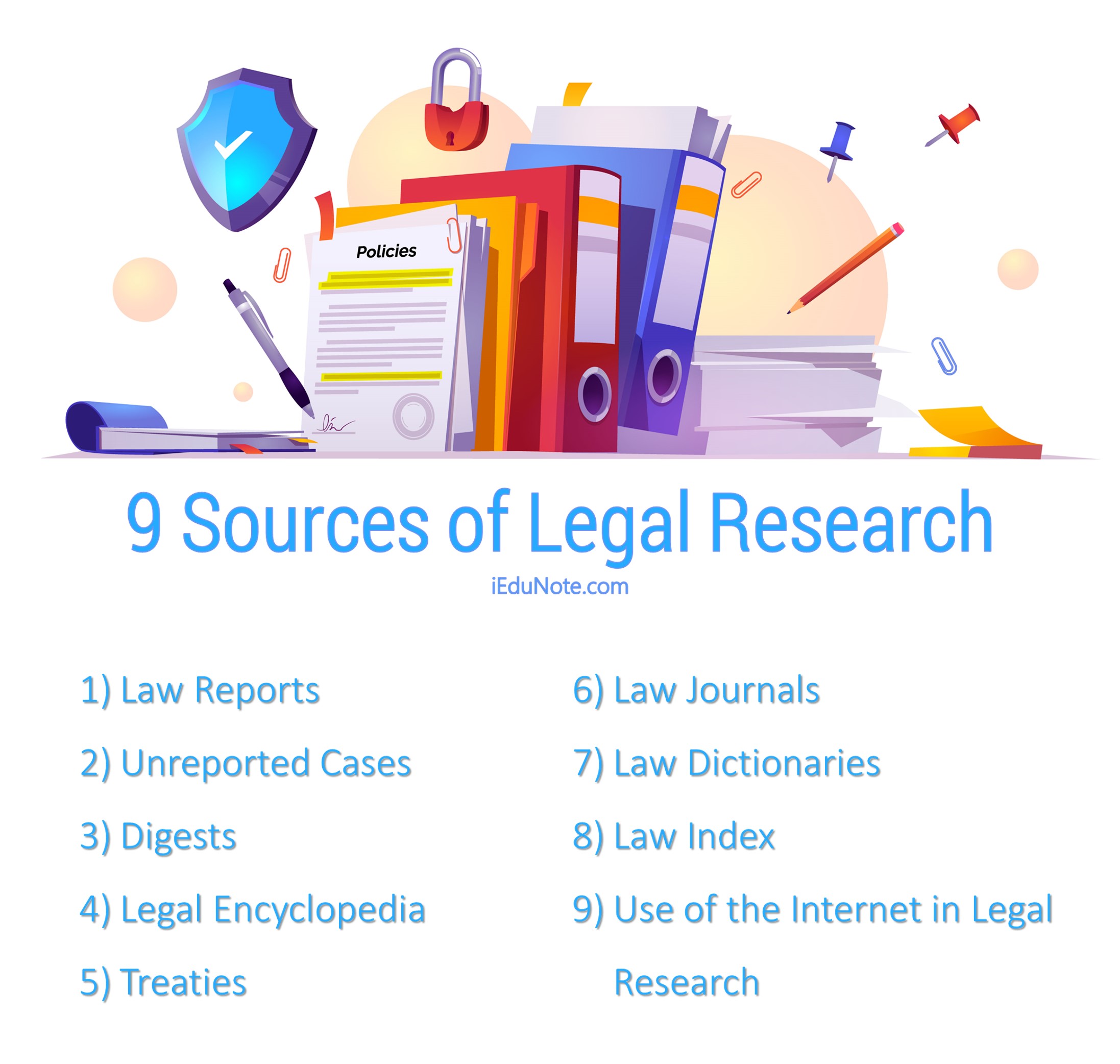Access to law and legal materials is a pre-condition for conducting legal research. Law reports provide an ideal avenue for primary sources such as statutory law and judicial decisions. There are nine sources of legal research.
9 Sources of Legal Research are;

Law Reports
Law reports play an important role in legal systems based on common law tradition.
A law report is usually a collection of published judicial decisions, which readily offers law students and lawyers reference to case materials. Law reporting makes judicial decisions accessible to lawyers and legal researchers.
Law reports are among the most important sources of legal authority in many legal systems.
A law report is not merely minutes of a trial because it does not record the evidence, examination, cross-examination, and other proceedings before the court.
Rather, it is an exposition of the law and an adequate record of a judicial decision on the point of law as only the issue and the facts relevant to the point of law are recorded.
The law report generally contains the parties’ names, the nature of the pleadings, the essential facts, the arguments of counsel, the decision, and the grounds for the judgment.
Not all cases are reported. Merely routine cases are excluded. The cases which make new law or are of general interest to the public are recorded.
Unreported Cases
Usually, decisions of the lower judiciary are not reported to law reports. Even reporting of cases of the higher judiciary is largely a matter of choice by the editor of the particular law reporter.
As a result, many cases of higher judiciary go unreported.
This does not mean that they are wholly irrelevant. In fact, an unreported decision is technical of precisely the same authority as one that is reported.
Moreover, although they are largely inaccessible to academics and researchers, transcripts of unreported cases of higher judiciary are available to judges and practicing lawyers.

Digests
Digests are a detailed subject index to the law outlined in the reported cases. Digests provide summaries of cases organized by subject. They provide subject access to cases that are published chronologically by case reporters.
In addition, digests usually contain headnote paragraphs of the published law reports. The reports of the cases from which these headnotes are taken are arranged in their respective bound volumes in chronological order by date of the decision, not in subject order.
The digest is a collection of separate paragraphs related to its counterparts only because it belongs in the same subject class and states a similar principle of law.
It follows that a digest is not the authority of any kind, even persuasive, but only a guide or index to finding such authority.
Legal Encyclopedia
Legal encyclopedias are summaries of the law and legal principles and doctrines. The encyclopedia provides background information for subjects.
But they do not present any critical analysis that is found in scholarly treaties or journal articles. It also provides exhaustive analytical and subject indexes.
Ideally, the encyclopedia can be the starting point in searching for the law and a reference for legal research as it serves as a text commentary on the law and a case-finder.
It begins with a general and elementary statement of the law, proceeds to a more detailed consideration of all aspects of the substantive law concerned, and ends with a discussion of the available remedies.
The famous legal encyclopedias include American Jurisprudence and Corpus Juris Secundum in England’s the USA and Halsbury’s laws.
Treaties
Legal treaties have played a vital role in legal research. Treaties are scholarly secondary sources and present a synthesis of judicial decisions and statutes.
Treaties provide an analysis of the law in an area and a more detailed background to the laws’ development.
Although they have only persuasive value, treaties written by scholars of outstanding reputation are well respected by the courts.
Treaties serve several purposes.
A person may use them to refresh their memory on the present state of the law covered by the book. Treaties may also be used in the detailed study of an aspect of the lawless thoroughly treated elsewhere.
As an index to the law, the treaties apply the author’s expert knowledge and research facilities to an exhaustive consideration of the decided cases and statutes.
The treaties then set down an exposition of the law, founded upon an exhaustive analysis. It thus goes a step beyond the digest, which supplies no comment.
There are lots of databases of treaties available online;
Law Journals
Law journals contain mostly recognized experts in various fields of law, comments on cases, legislative materials, and book reviews.
The most scholarly commentary in law can be found in academic legal journals. There are also specialized law journals for legal professions.
They discuss new developments in law, focus on policy issues, or highlight the jurisprudential view of the legal issues.
Thus, to develop the widest possible understanding of the law and to develop one’s analytical ability, it is essential to read law journals as much as possible.
Law Dictionaries
Consultation of legal dictionaries as a secondary source to find out background information can never be underestimated. The law dictionary defines and illustrates the meaning of words, terms, and phrases with legal significance.
To find out the meaning of words used in the study of law, it is always preferable to use a law dictionary rather than a common English language dictionary.
Some of the well-known law dictionaries are;
Law Index
The Law index also provides valuable information on the location of statutes.
Use of the Internet in Legal Research
Electronic or internet sources have increasingly become essential sources of legal research in the present day. The internet represents a paradigm shift in legal research. One can access a vast amount of information on a variety of topics. In addition, the internet is beneficial for finding current and historical information.
Legal professionals looking to enhance their research capabilities can benefit greatly from legal software training. This training equips users with the skills to efficiently utilise advanced tools and platforms, streamlining their legal research processes. For instance, this useful guide provides detailed insights into legal software training and how it can help legal practitioners perform their jobs better in various instances.
The internet provides users with a constantly increasing body of readily accessible information. Legal information available on the internet is usually secondary.
But it also contains primary sources.
Many primary sources, including legislation, case law, and international legal materials, can be accessed on the internet. Internet is a beneficial source of legal information, particularly international law, trade law, and private international law.
International treaties and declarations are now widely available through the websites of the UNs and other international organizations. The UN Treaty Section provides free access to its treaty database to institutions in developing countries.
Some websites: www.un.org, www.icj.org, www.wto.org. Same primary and secondary sources can be found in print format and online sources.
Nowadays, many journals and books are available electronically.
Thus, the online or electronic source is just another way of retrieving the same information using different tools.
Therefore, the difference between print and internet sources lies not in the information itself; the tools and methods for retrieving that information differ.
However, it should be borne in mind that the internet is no substitute for printed materials. Rather, it is a complementary research tool after primary and secondary sources.
The main advantages of online sources are that the information provided frequently is more current than printed sources, and online information can be updated immediately.
At the same time, it takes time for print sources to be updated and published.
But the information available from such sites may not always be accurate and complete. Moreover, they may lack authenticity, credibility, and reliability.
Sometimes internet articles do not contain full references or citations. The author and publisher of the site are not sometimes mentioned. Anyone can publish anything for any purpose without incurring high costs and with little expertise.
One of the biggest disadvantages of internet resources is the lack of comprehensiveness.
Unlike traditional print resources, web resources are rarely edited by credible persons. The most comprehensive primary legal materials are still available in printed form.
Electronic information is contained on “Web pages or websites.”; Web sites’ have two varieties: sites that are free and available to the general public and sites that require a license or fee to access.
Individuals maintain non-fee-based websites, non-profit organizations, or educational institutions. But fee-based sites are maintained with great care and integrity, reliably serving the information needs of researchers.
Westlaw, LexisNexis, HeinOnline, JSTOR are prominent examples of fee-based websites. On fee-based websites, only authorized or licensed users can access the information contained on the site.
However, many free internet sites provide primary sources, journals, and other secondary literature consistent with the standard of non-fee-based websites.
For example, many primary information sources are the websites of international organizations (such as the UNO, World Bank, WTO, UNCTAD, OECD, IEA, IMF, etc.), academic institutions, governmental departments, international NGOs, and multinational companies.